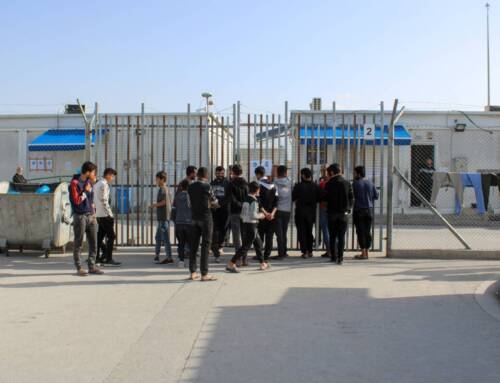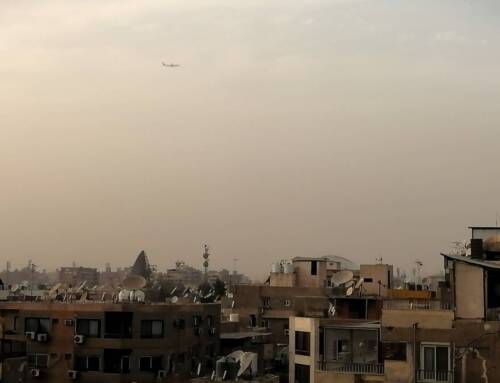Displaced months ago, ‘undocumented’ Palestinians in Syria’s rebel-held northwest hope for end to civil status limbo
Residents threw their bags onto the roofs of the evacuation buses, years-old rubble tumbling from their apartment blocks into the streets outside.
4 March 2019
Displaced men from Yarmuk speak around a bonfire in the Deir Ballut refugee camp in Afrin's countryside on November 16, 2018. Photo by Rami al Sayed/AFP.
AMMAN: Residents threw their bags onto the roofs of the evacuation buses, years-old rubble tumbling from their apartment blocks into the streets outside.
Several thousand Palestinian-Syrian refugees and Syrians were forcibly evacuated by bus last spring from the southern Damascus suburbs—including the Yarmouk camp for Palestinian refugees as well as the neighboring villages of Yalda, Babila and Beit Sahem—following a “zero-hour” government offensive on Islamic State (IS) forces there last spring.
Palestinians who arrived in the north soon found themselves in a legal limbo, often stuck in hastily put-together camps like Deir Ballut in western Aleppo province’s Afrin countryside, where services are infamously poor despite being directly administered by the Turkish government.
Camp residents have already weathered a blistering summer and bitter winter of torrential rain and flooded tents, with many routinely accusing Turkish authorities responsible for services in the camp of neglect.
However, Palestinians in the camp say their lack of recognized civil status documentation is a more longstanding concern.
“Right now, we don’t have any legal resources at all,” said Jalal Abu Karam, a Palestinian activist originally from Yarmouk camp who has two children without opposition-issued civil documents. “Here in Deir Ballut camp, nobody has provided any [civil] documentation since when we left South Damascus.”
While Abu Karam’s children were registered by proxy while the family were still in South Damascus, parents of children born after the displacement north have no legal record of the births. The same goes for marriages, divorces and deaths.
“My son was born 20 days ago,” said Abu Muhammad, a Palestinian-Syrian refugee living close to Deir Ballut after being displaced north, who requested that his real name be withheld in this report.
“We only have a medical record from the health center in Jandaris [a town next to Deir Ballut], and I don’t know where to register my son [officially].”
Without valid documents in Syria’s rebel-held northwest, Palestinian refugees have struggled to obtain assistance and aid for themselves and their families as well as move around safely.
‘Many cases simply go undocumented’
“[Palestinian refugees in the northwest] face many challenges, including access to education and a lack of documentation proving their Palestinian nationality,” a representative from the London-based Action Group for Palestinians of Syria told Syria Direct. “This is especially important for Palestinians, because the loss of someone’s Palestinian identity will prevent them from claiming right of return to Palestine.”
And yet, Palestinian-Syrians in northwestern Syria will now have access to civil documentation procedures—allowing them to register births, deaths and marriages with a new, locally run opposition body for the first time since their displacement north last year.
Established last week on February 26, the body known as the Documentation Center for Palestinian Refugees falls under the opposition’s Syrian Interim Government (SIG) that already conducts civil registry duties for local residents and displaced Syrians present in the rebel-held northwest.
Ammar al-Qudsi, a Palestinian lawyer who heads the documentation center, emphasized the “urgent humanitarian and legal necessity for Palestinian refugees forcibly displaced to northern Syria.”
“Since our displacement to the north, marriages, divorces and deaths have been documented in civil records but only through private means,” he told Syria Direct, adding that families have attempted to use proxies to register their civil status procedures in lieu of any local authority in the northwest.
“But many cases simply go undocumented.”
According to Abdel Razeq Razouq, director of the SIG’s General Administration for Civilian Affairs, “documents issued by the center, specifically for our Palestinian brothers, are necessary to preserve their identity and their right to return to their homeland.”
Civil status procedures would also guarantee Palestinian refugees’ rights to “receive support from international organizations,” he told Syria Direct, without elaborating.
In Deir Ballut, fraud is now another—more immediate—issue.
“People are forging their documents in the camp [to change them] from Syrian to Palestinian, greedy for the special aid given to Palestinians” by particular organizations, Abu Karam, the Yarmouk-born activist now in Deir Ballut told Syria Direct. “I know more than 15 people whom everyone knows are Syrian, but you see their ID and you find that they are ‘Palestinian’.”
“Praise be to God,” he joked, “everyone in the camp has become Palestinian!”
Registration from scratch
Established by Syria’s opposition in 2013 as an alternative to the Syrian government, the SIG administers areas under its control from its headquarters in the southeastern Turkish city of Gaziantep.
The SIG has previously struggled to accommodate Syrians displaced from around the country, who were issued civil documents by opposition-run local councils in other rebel-held pockets around the country.
Displaced Syrians from East Ghouta boarded evacuation buses northwards in April last year, and soon found opposition authorities in the northwest either unwilling or unable to accept their documents, previously issued by local councils in the sprawling Damascus suburbs—despite the fact that local councils in both areas were nominally under the control of the SIG.
As a result, thousands of displaced Syrians from around the country ended up caught in messy, cyclical bureaucratic wrangles for reaffirming wartime marriages and births from scratch. Each civil status procedure had to be re-registered, new documents produced.
Inconsistencies not only emerged between councils from disparate areas of the country—but even within neighboring areas of rebel-held northern Syria, according to displaced Syrians and local council officials.
Palestinian refugees now in the northwest evacuated their homes with only UNRWA- and government-issued documents, but also had no institution to register—let alone re-register—civil status procedures.
To complicate matters further, effectively stateless Palestinian-Syrian refugees have historically existed in a separate system of documentation and civil status registration to Syrian nationals since long before Syria’s 2011 uprising and ensuing conflict, meaning that basic procedures have been difficult—if not virtually impossible—since their displacement north.
However, new opposition-issued documents could have little impact outside the confines of Syria’s northwest, particularly for those refugees hoping to one day return to their homes in Damascus.
Crucially, there appears to be no coordination between opposition-affiliated authorities in the northwest and the General Authority for Palestinian Arab Refugees (GAPAR), a governmental body headquartered in Damascus that for decades issued all Palestinian-Syrian refugees with IDs, travel documents and civil documentation papers.
GAPAR, originally established in 1949 as a department within the Syrian government’s Ministry of Labour and Social Affairs, still handles the civil affairs of Palestinian refugees in Syria including registration of births, deaths and marriages.
Most Palestinians in Syria are also eligible to apply to GAPAR for the Palestinian travel document and government-issued ID card that affords Palestinians legal rights, similar to those of Syrian citizens, while also recording each refugee’s Palestinian origins.
UNRWA, the UN’s agency for Palestinian refugees, also registers Palestinians eligible under its mandate.
The lack of GAPAR involvement in the new SIG initiative likely means that Palestinian refugees who one day go back to Damascus could still have to re-register all opposition-issued civil status documents with the Syrian government.
The Syrian government has already refused to recognize opposition-issued documents from East Ghouta.
At the same time, UNRWA has no presence in opposition-held northwestern Syria. UNRWA is restricted to operating in government-held areas, and does so amid growing budget shortfalls.
Refugees can, in theory, go to the agency’s office in government-held Aleppo city office to collect UNRWA-provided cash assistance—however, that means crossing a series of pro-government checkpoints separating opposition- and government-held territory. For some, the risks are just too great.
As a result, many Palestinians in the north say they feel neglected.
“Official and informal Palestinian institutions have no role in managing the affairs of Palestinian refugees forcibly displaced to the north of Syria from across [the country],” said al-Qudsi.
Activist Hamada Hameed, also in Deir Ballut, meanwhile told Syria Direct that he hopes “that [the new registry] could be recognized like a civil registry in any of the other provinces [in Syria],” something made more difficult by UNRWA’s absence in opposition areas.
An UNRWA spokesperson could not be reached for comment before publication.
Syria was home to some 560,000 Palestinian refugees on the eve of the country’s 2011 uprising and ensuing conflict—although a majority of the community have since been displaced internally or outside Syria altogether.







